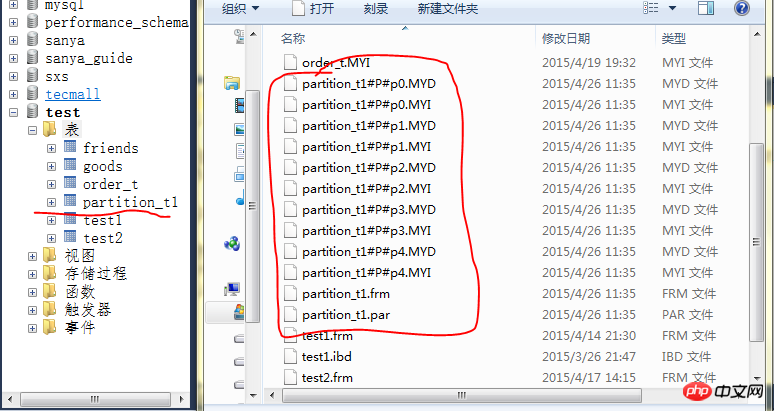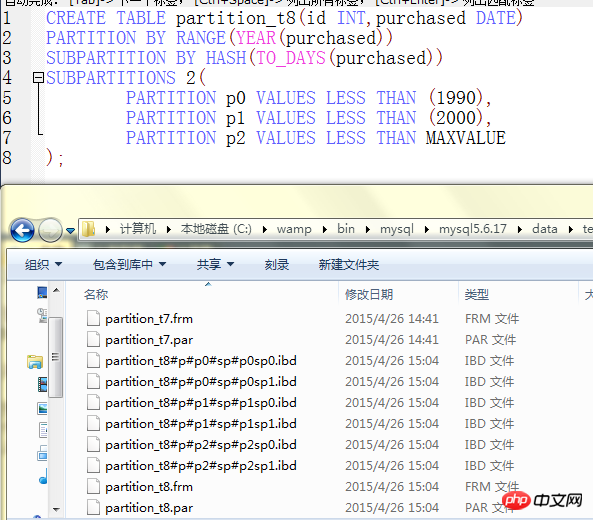Detailed introduction to partitions in mysql
Overview
Before, when I saw the partition, I pinched it, it was so tall. Yesterday I finally learned what partitioning is, but it’s nothing more than that. To summarize today, a good memory is not as good as a bad writing.
MySQL Supports partitioning function starting from 5.1. One sentence for partitioning is: Divide a table into multiple areas (pages/files) according to certain rules (range/list/hash/key, etc.) for storage. For mysql application development, there is no difference between partitioning and non-partitioning (that is, it is transparent to the application). It's like "breaking it into pieces" in a breakout battle. MySQL supports most storage engines (such as MyISAM, InnoDB, Memory, etc.) to create partitions, but does not support MERGE and CSV to create partitions. All partitions in the same partition table must be of the same storage engine. Make an example:
#创建一个5个hash分区的myisam表 CREATE TABLE `test`.`partition_t1`( `id` INT UNSIGNED NOT NULL, `username` VARCHAR(30) NOT NULL, `email` VARCHAR(30) NOT NULL, `birth_date` DATE NOT NULL ) ENGINE=MYISAM PARTITION BY HASH(MONTH(birth_date)) PARTITIONS 5;

Example result
Partitioning effect
Can store more data (maximum limit of a single file in the system)
Optimize the query, in the where clause, if the partition condition is included, only one needs to be scanned Or partially partition to improve query efficiency. When it comes to functions such as sum(), it can be processed in parallel on the partitions and the results are finally summarized.
For expired or unnecessary data, you can delete related partitions to quickly delete the data.
By distributing data queries across multiple disks, the concurrency capability of a single table is improved, and the disk I/O performance is also improved.
Partition type
is divided into 4 types:
range partition: based on a given The continuous interval range of the data is allocated to different partitions.
List partitioning: similar to range partitioning, the difference is that list is partitioned based on the enumerated value list, and range is partitioned based on the range.
Hash partition: Based on the given number of partitions, allocate data to different partitions (modulo/linear)
key partition: Similar to hash partitioning.
In MySQL5.1, range, list, and hash partitioning require that the partition key must be int. MySQL 5.5 and above supports non-integer range and list partitions, namely: range columns and list columns.
Note: No matter what kind of partitioning, there is either no primary key/unique key on the partition table, or one of the partition keys must be a primary key/unique key.
1.range partitioning
Range partitioning uses value ranges (intervals) to divide partitions. The intervals must be continuous and cannot overlap each other. Use values less thanOperator performs partition definition.
Example 1:
CREATE TABLE `test`.`partition_t2`( `id` INT UNSIGNED NOT NULL, `username` VARCHAR(30) NOT NULL, `email` VARCHAR(30) NOT NULL, `birth_date` DATE NOT NULL ) ENGINE=MYISAM PARTITION BY RANGE(id)( PARTITION t21 VALUES LESS THAN (10), PARTITION t22 VALUES LESS THAN (20), PARTITION t23 VALUES LESS THAN MAXVALUE );
The above example defines a range partition table containing 3 partitions (t21, t22, t23). This is somewhat similar Same as the <a href="http://www.php.cn/code/5745.html" target="_blank">switch statement</a> in high-level languages. The explanation is as follows: when id<10, it is in the t21 partition; when 20>id>=10, it is in the t22 partition; when id>=20, it is in the t23 partition.
Example 2:
CREATE TABLE `test`.`partition_t3`( `id` INT UNSIGNED NOT NULL, `username` VARCHAR(30) NOT NULL, `email` VARCHAR(30) NOT NULL, `birth_date` DATE NOT NULL ) ENGINE=MYISAM PARTITION BY RANGE COLUMNS(birth_date)( PARTITION t31 VALUES LESS THAN ('1996-01-01'), PARTITION t32 VALUES LESS THAN ('2006-01-01'), PARTITION t33 VALUES LESS THAN ('2038-01-01') );
MySQL5.5 improves range partitioning and provides range columns partitioning to support non-integer partitioning.
2.list partition
list partition creates a discrete value list (similar to enum type data in mysql) to divide the partition, use values inoperator to partition. List partitions do not need to be declared in any particular order. Lists are similar to ranges in many ways.
CREATE TABLE `test`.`partition_t4`( `id` INT UNSIGNED NOT NULL, `username` VARCHAR(30) NOT NULL, `email` VARCHAR(30) NOT NULL, `birth_date` DATE NOT NULL ) ENGINE=MYISAM PARTITION BY LIST(id)( PARTITION t41 VALUES IN (1,2), PARTITION t42 VALUES IN (3,6), PARTITION t43 VALUES IN (5,4), PARTITION t44 VALUES IN (7,8) );
The above example is that when the id is 1 or 2, it is in the t41 partition; when the id is 3 or 6, it is in the t42 partition, and so on...
3 .hash partition
Hash partition is mainly used to disperse hotspot reads to ensure that data is distributed as evenly as possible among a predetermined number of partitions. When a table performs hash partitioning, MySQL applies a hash function to the partition key to determine which of the n partitions the data should be placed in. Hash partition supports two hash functions (partitioning methods): modulo algorithm (default hash partitioning method) and linear power-of-2 algorithm (liner hash partitioning) .
Regular hash partition
#顶部引例就是常规hash分区
mysql does not recommend using hashexpressions involving multiple columns.
Conventional hashing brings too much cost in partition management and is not suitable for the needs of flexible partitions. See: Consistent Hash Algorithm
Because of the management problems of conventional hash partitioning, all mysql introduces linear hash partitioning.
Linear hash partition
CREATE TABLE `test`.`partition_t5`( `id` INT UNSIGNED NOT NULL, `username` VARCHAR(30) NOT NULL, `email` VARCHAR(30) NOT NULL, `birth_date` DATE NOT NULL ) ENGINE=MYISAM PARTITION BY LINEAR HASH(id) PARTITIONS 5;
Copy after loginIn the above example, a linear hash partition of 5 partitions is created.
Advantages of linear hash partitioning: MySQL can handle partition maintenance faster;
线性hash分区缺点:分区各个分区之间数据分布不太均衡。
4.key分区
hash分区允许用户自定义的表达式,而key分区不允许使用用户自定义的表达式。
hash分区只支持整数分区,key分区支持除了blob或text类型之外的其他数据类型分区。
与hash分区不同,创建key分区表的时候,可以不指定分区键,默认会选择使用主键/唯一键作为分区键,没有主键/唯一键,必须指定分区键。
CREATE TABLE `test`.`partition_t6`( `id` INT UNSIGNED NOT NULL, `username` VARCHAR(30) NOT NULL, `email` VARCHAR(30) NOT NULL, `birth_date` DATE NOT NULL ) ENGINE=MYISAM PARTITION BY LINEAR KEY(email) PARTITIONS 5;
columns 与子分区
1.columns分区
columns 包括range columns与list columns 支持非整型的分区键。columns分区支持多列分区。
CREATE TABLE `test`.`partition_t7`(
`a` INT UNSIGNED NOT NULL,
`b` INT UNSIGNED NOT NULL
)
PARTITION BY RANGE COLUMNS(a,b)(
PARTITION p0 VALUES LESS THAN (0,10),
PARTITION p1 VALUES LESS THAN (10,10),
PARTITION p2 VALUES LESS THAN (10,20),
PARTITION p3 VALUES LESS THAN (10,35),
PARTITION p4 VALUES LESS THAN (10,MAXVALUE),
PARTITION p5 VALUES LESS THAN (MAXVALUE,MAXVALUE)
);判断依据:(a<10) or ((1=10) and (10<10))。
2.子分区
子分区是分区表中对每一个分区的再次分割,又被称为复合分区。MySQL从MySQL5.1开始支持对通过range和list的表再进行子分区,子分区即可以hash分区,也可以使用key分区。子分区适合保存非常大量的数据记录。
CREATE TABLE partition_t8(id INT,purchased DATE)
PARTITION BY RANGE(YEAR(purchased))
SUBPARTITION BY HASH(TO_DAYS(purchased))
SUBPARTITIONS 2(
PARTITION p0 VALUES LESS THAN (1990),
PARTITION p1 VALUES LESS THAN (2000),
PARTITION p2 VALUES LESS THAN MAXVALUE
);
mysql子分区
分区管理
MySQL5.1提供添加、删除、重定义、合并、拆分分区命令。
1.range或list分区
#删除分区
alter table partition_t8 drop partition p2;
#添加一个分区
alter table partition_t8 add partition(
partition p4 values less than (2030)
)
#重定义一个分区
alter table partition_t8 reorganize partition p3 into(
partition p2 values less than (2005),
partition p3 values less than (2015)
);只能从range分区列表最大端增加分区。
增加list分区,不能添加一个包含现有分区值列表中的任意值分区,也就是说对一个固定的分区键值,必须指定并且只能指定一个唯一的分区。
重新定义range分区,只能够重新定义相邻的分区,同时重新定义的分区区间必须和原分区区间覆盖相同的区间。
2.hash或key分区
#减少分区数,(如将分区数减少到2) alter table partition_t8 coalesce partition 2; #增加分区数(如:为分区数增加了8) alter table partiton_t8 add partition partitions 8;
coalesce不能用来增加分区数量。
【相关推荐】
2. MySQL最新手册教程
3. 数据库设计那些事
The above is the detailed content of Detailed introduction to partitions in mysql. For more information, please follow other related articles on the PHP Chinese website!

Hot AI Tools

Undresser.AI Undress
AI-powered app for creating realistic nude photos

AI Clothes Remover
Online AI tool for removing clothes from photos.

Undress AI Tool
Undress images for free

Clothoff.io
AI clothes remover

Video Face Swap
Swap faces in any video effortlessly with our completely free AI face swap tool!

Hot Article

Hot Tools

Notepad++7.3.1
Easy-to-use and free code editor

SublimeText3 Chinese version
Chinese version, very easy to use

Zend Studio 13.0.1
Powerful PHP integrated development environment

Dreamweaver CS6
Visual web development tools

SublimeText3 Mac version
God-level code editing software (SublimeText3)

Hot Topics
 1657
1657
 14
14
 1415
1415
 52
52
 1309
1309
 25
25
 1257
1257
 29
29
 1230
1230
 24
24
 MySQL's Role: Databases in Web Applications
Apr 17, 2025 am 12:23 AM
MySQL's Role: Databases in Web Applications
Apr 17, 2025 am 12:23 AM
The main role of MySQL in web applications is to store and manage data. 1.MySQL efficiently processes user information, product catalogs, transaction records and other data. 2. Through SQL query, developers can extract information from the database to generate dynamic content. 3.MySQL works based on the client-server model to ensure acceptable query speed.
 How to start mysql by docker
Apr 15, 2025 pm 12:09 PM
How to start mysql by docker
Apr 15, 2025 pm 12:09 PM
The process of starting MySQL in Docker consists of the following steps: Pull the MySQL image to create and start the container, set the root user password, and map the port verification connection Create the database and the user grants all permissions to the database
 Laravel Introduction Example
Apr 18, 2025 pm 12:45 PM
Laravel Introduction Example
Apr 18, 2025 pm 12:45 PM
Laravel is a PHP framework for easy building of web applications. It provides a range of powerful features including: Installation: Install the Laravel CLI globally with Composer and create applications in the project directory. Routing: Define the relationship between the URL and the handler in routes/web.php. View: Create a view in resources/views to render the application's interface. Database Integration: Provides out-of-the-box integration with databases such as MySQL and uses migration to create and modify tables. Model and Controller: The model represents the database entity and the controller processes HTTP requests.
 Solve database connection problem: a practical case of using minii/db library
Apr 18, 2025 am 07:09 AM
Solve database connection problem: a practical case of using minii/db library
Apr 18, 2025 am 07:09 AM
I encountered a tricky problem when developing a small application: the need to quickly integrate a lightweight database operation library. After trying multiple libraries, I found that they either have too much functionality or are not very compatible. Eventually, I found minii/db, a simplified version based on Yii2 that solved my problem perfectly.
 MySQL and phpMyAdmin: Core Features and Functions
Apr 22, 2025 am 12:12 AM
MySQL and phpMyAdmin: Core Features and Functions
Apr 22, 2025 am 12:12 AM
MySQL and phpMyAdmin are powerful database management tools. 1) MySQL is used to create databases and tables, and to execute DML and SQL queries. 2) phpMyAdmin provides an intuitive interface for database management, table structure management, data operations and user permission management.
 Laravel framework installation method
Apr 18, 2025 pm 12:54 PM
Laravel framework installation method
Apr 18, 2025 pm 12:54 PM
Article summary: This article provides detailed step-by-step instructions to guide readers on how to easily install the Laravel framework. Laravel is a powerful PHP framework that speeds up the development process of web applications. This tutorial covers the installation process from system requirements to configuring databases and setting up routing. By following these steps, readers can quickly and efficiently lay a solid foundation for their Laravel project.
 MySQL vs. Other Programming Languages: A Comparison
Apr 19, 2025 am 12:22 AM
MySQL vs. Other Programming Languages: A Comparison
Apr 19, 2025 am 12:22 AM
Compared with other programming languages, MySQL is mainly used to store and manage data, while other languages such as Python, Java, and C are used for logical processing and application development. MySQL is known for its high performance, scalability and cross-platform support, suitable for data management needs, while other languages have advantages in their respective fields such as data analytics, enterprise applications, and system programming.
 MySQL vs. Other Databases: Comparing the Options
Apr 15, 2025 am 12:08 AM
MySQL vs. Other Databases: Comparing the Options
Apr 15, 2025 am 12:08 AM
MySQL is suitable for web applications and content management systems and is popular for its open source, high performance and ease of use. 1) Compared with PostgreSQL, MySQL performs better in simple queries and high concurrent read operations. 2) Compared with Oracle, MySQL is more popular among small and medium-sized enterprises because of its open source and low cost. 3) Compared with Microsoft SQL Server, MySQL is more suitable for cross-platform applications. 4) Unlike MongoDB, MySQL is more suitable for structured data and transaction processing.




